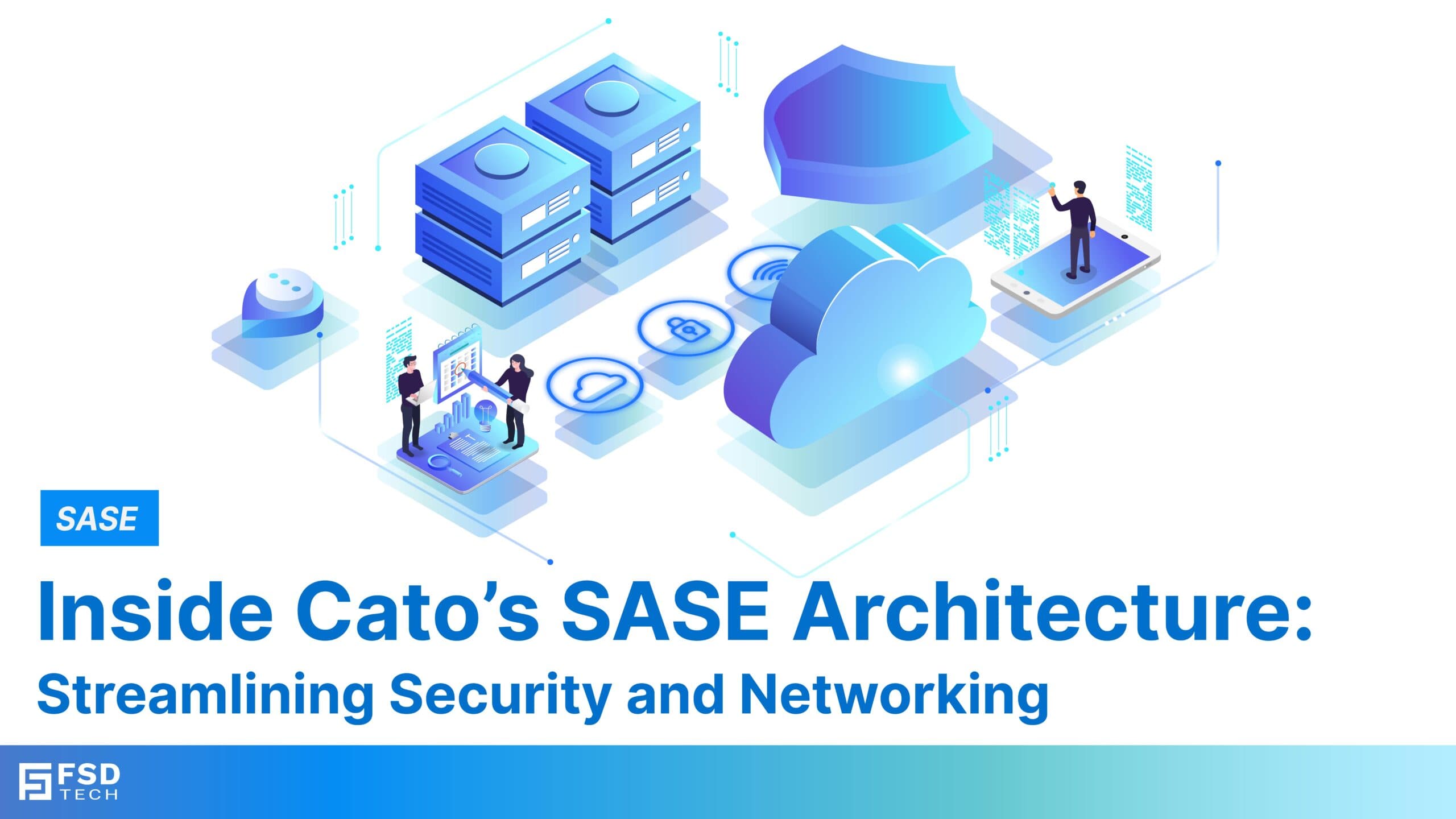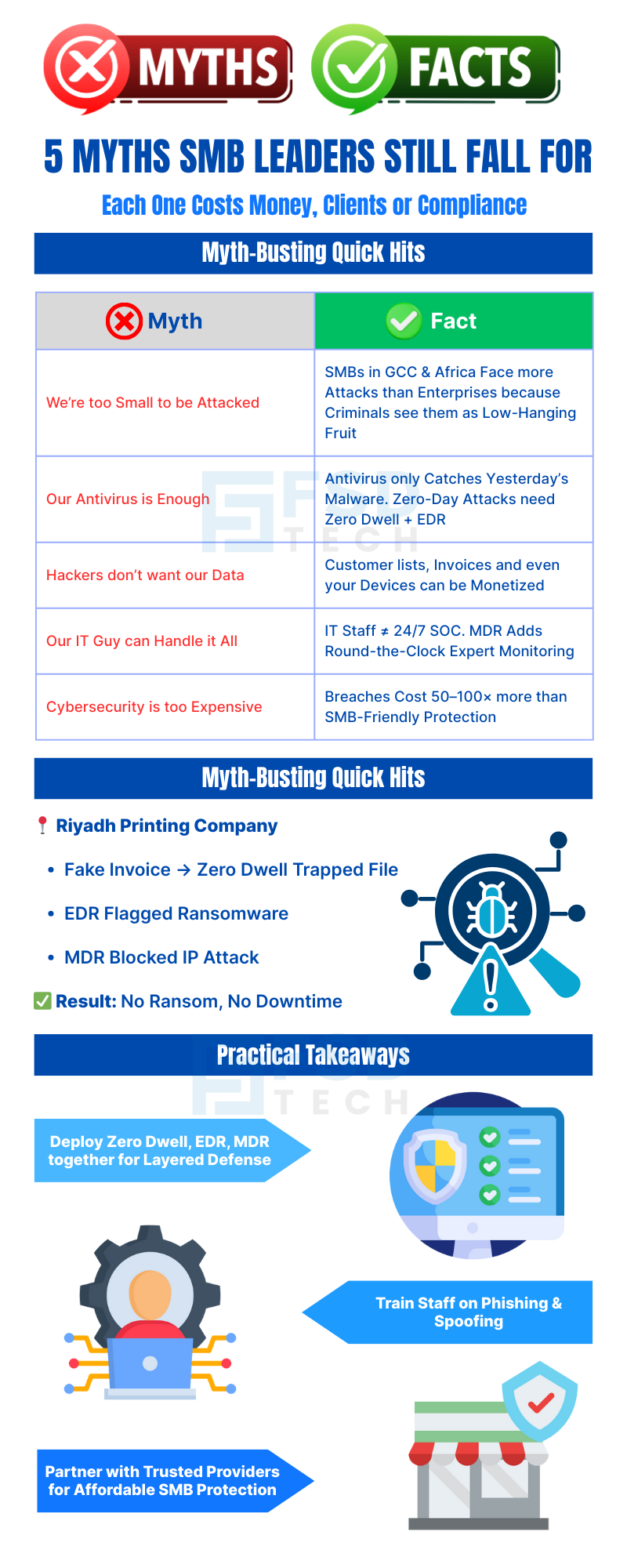
Inside Cato’s SASE Architecture: A Blueprint for Modern Security
🕓 January 26, 2025

Last year, a family-owned logistics company in Nairobi suffered a cyberattack that cost them over $120,000 in recovery costs and lost contracts.
The owner was shocked.
Why?
Because he believed five common myths about cybersecurity.
He thought:
All five turned out to be false — and the price for believing them was high.
The Truth:
Hackers love targeting SMBs because they often have weaker defenses.
They know you probably don’t have a 24/7 security team or advanced tools.
In GCC & Africa, SMBs are actually more frequently attacked than large enterprises because they’re seen as “low-hanging fruit.”
The Truth:
Antivirus only protects against known threats.
Modern attacks — like zero-day malware — can bypass antivirus entirely.
You need Zero Dwell Containment to stop unknown files before they run.
The Truth:
Even if you think your data isn’t valuable, hackers can:
Every business has something a hacker can profit from.
Think your business is too small to be a target? Let us prove otherwise. Get a free SMB risk assessment today.
The Truth:
Your IT staff can fix computers, set up networks, and troubleshoot problems — but advanced cyber defense requires specialized skills and 24/7 monitoring.
MDR (Managed Detection & Response) adds a dedicated security team to work alongside your IT department.
The Truth:
The cost of a breach can be 50–100 times higher than the cost of protection.
With FSD-Tech’s SMB-friendly plans, you can get EDR + MDR + Zero Dwell Containment for less than your monthly internet bill per device.
Even basic awareness training can reduce employee mistakes.
FSD-Tech helps SMBs in GCC & Africa with enterprise-grade protection at SMB prices.
Riyadh Printing Company
Outcome: No downtime, no ransom paid, no data lost.
Cybersecurity myths are dangerous because they create a false sense of safety.
The reality is, SMBs are prime targets, and protection is affordable and easy to deploy.
Not sure where to start? Book a free consultation with FSD-Tech’s experts. We’ll show you exactly how to protect your SMB without breaking your budget. Schedule your session today.

Yes. Hackers often target small and mid-sized businesses (SMBs) because they usually have weaker defenses, smaller budgets for security, and no dedicated 24/7 security teams. In GCC & Africa, SMBs are actually attacked more often than large enterprises because cybercriminals see them as easy targets.
No. Antivirus can only stop known threats — the ones already in its database. New or advanced attacks, called zero-day threats, can bypass antivirus. You need advanced tools like Zero Dwell Containment and EDR (Endpoint Detection & Response) to stop both known and unknown threats.
Every business has something valuable — customer lists, financial records, supplier details, or login credentials. Even if you think your data isn’t valuable, hackers can lock it and demand ransom, use your systems for further attacks, or sell your information online.
Your IT team can manage systems, fix issues, and keep operations running, but cybersecurity requires specialized skills and constant 24/7 monitoring. MDR (Managed Detection & Response) adds a dedicated security team to work alongside your IT staff, watching for threats round-the-clock.
No. The cost of a breach can be 50–100 times higher than the cost of protection. With solutions like FSD-Tech’s EDR + MDR + Zero Dwell, SMBs can get enterprise-grade security for as little as $2–$5 per device/month.
Zero Dwell Containment is technology that instantly isolates unknown files before they run. If the file is safe, it’s released. If it’s dangerous, it’s blocked before it can cause damage — even if an employee clicks on it.
EDR constantly monitors devices for unusual activity. If a threat appears, EDR responds by blocking it and alerting the team. This is crucial for detecting sophisticated attacks that antivirus alone can’t catch.
SEO Keywords: EDR endpoint detection SMB GCC, advanced threat monitoring Africa SMB, SMB endpoint security GCC.
MDR combines technology with a human security team. These experts monitor your systems 24/7, investigate alerts, and respond to threats in real time, even outside your working hours.
Yes. Many GCC and African countries have strict data protection laws. Using tools like EDR, MDR, and Zero Dwell Containment helps you meet these requirements and avoid fines.
We can set up protection for all your devices in as little as one business day — without disrupting your work.
Even well-trained employees can make mistakes. Zero Dwell traps suspicious files, EDR detects unusual activity, and MDR responds instantly — turning a mistake into a non-event.
Yes. EDR, MDR, and Zero Dwell protect devices no matter where they are — in the office, at home, or on the move.
Believing myths can lead to massive financial losses, damaged reputation, customer loss, and legal troubles. The cost is far greater than investing in the right protection upfront.
We provide Xcitium’s award-winning EDR, MDR, and Zero Dwell Containment — tailored for SMB budgets in GCC & Africa — with local support and fast deployment.
Start with a free security assessment from FSD-Tech. We’ll review your current setup, find gaps, and recommend an SMB-friendly solution that fits your needs and budget.

Anas is an Expert in Network and Security Infrastructure, With over seven years of industry experience, holding certifications Including CCIE- Enterprise, PCNSE, Cato SASE Expert, and Atera Certified Master. Anas provides his valuable insights and expertise to readers.
Share it with friends!
share your thoughts